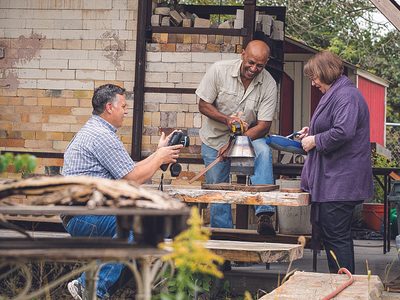
“I want to find a way to make my climate science class more fun,” chemistry professor Deborah Gross recalls saying to environmental studies professor Tsegaye Nega. Gross had been teaching the course on and off for a few years and, although it was working fine, she felt it could use a little something more.
Together, Gross and Nega developed a course that addressed both the climate system and its links to human health issues. But before they had a chance to teach the new course, Nega won a Fulbright Fellowship to spend a year working and teaching in Ethiopia.
Instead of scrapping their plans, they decided to take advantage of the opportunity. On campus, Gross taught “Climate Change and Human Health,” and at Addis Ababa University in Ethiopia, Nega taught his version of the class to a group of graduate students. Through videoconferencing equipment, the two classes met jointly once a week. A variety of Ethiopian guest lecturers, including representatives from the World Health Organization, gave presentations to the combined classes on air quality, the impact of flooding, and other climate topics that affect human health. Then students from both institutions discussed together what they’d learned.
Collaborative and international learning has practically become a hallmark of Gross’s and Nega’s teaching. In 2012 they began a project to develop a stove could replace the charcoal-burning ones most Ethiopians have access to, which produce harmful emissions. Nega spent the next several years working with colleagues to build a more efficient, affordable stove while Gross and her students helped test the prototypes. They embedded this project in their new joint course as a case study; students analyzed data about how Ethiopians make decisions about cooking and fuel use and how those decisions affect their health and the environment.
And for some of the students, the experience wasn’t over at the end of the term. Five students from Gross’s class traveled to Ethiopia for two weeks to help Nega launch a field test for the cookstove. Accompanied by translators, the students taught families how to use the new stoves, which burn pellets made of waste products like sawdust and coffee bean husks.
“I’ve run off-campus programs since 2008,” says Nega. “It’s not an exaggeration to say that we did more in these two weeks than we’ve ever been able to do on those programs. Deborah and I did a lot of the background work, but we put the families in the students’ hands. The students never hesitated. They wanted to be there, working.
“It’s not simply a matter of learning. It’s a matter of recognizing that they can make a difference.”